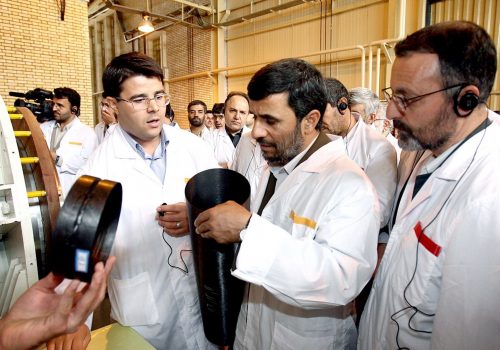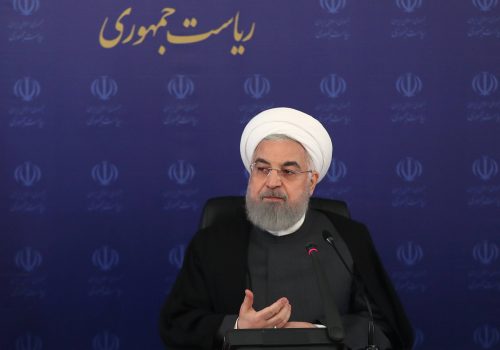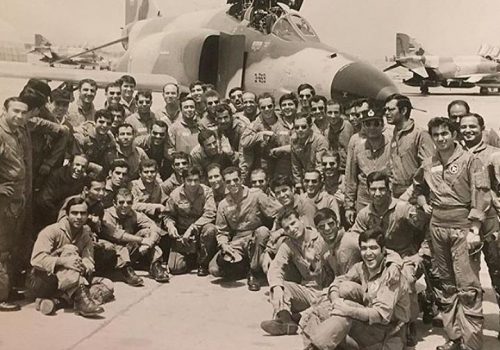Saeed Mohammad: The young face of the IRGC weighing his political options
As Iran is approaching its thirteenth presidential elections in June, there are widespread speculations on who will run in the upcoming elections. Meanwhile, the failure of the Hassan Rouhani administration’s promise to deliver economic relief from US economic sanctions has increased the possibility that a hardliner candidate close to the security apparatus will become Iran’s next president. Among those rumored to be running in the elections is Saeed Mohammad, a 52-year-old Second Class Brigadier General of the Islamic Revolutionary Guard Corps (IRGC), who is currently serving as the commander of the US-sanctioned Khatam Al-Anbiya Construction Headquarters (KAA), the engineering firm of the Guards.
Born in 1968 in Tehran, Mohammad joined the IRGC at the age of nineteen, almost a year before the conclusion of the Iran-Iraq war in 1988. What distinguishes Mohammad from his fellow IRGC cadre is his lack of substantial military experience, which he has compensated for with a large portfolio of executive positions and academic achievements. It is noteworthy that his predecessors at the KAA, including current Speaker of Parliament Mohammad Baqer Qalibaf, former oil minister Hossein Rostami, and IRGC General Ebadollah Abdollahi (whom Mohammad replaced in 2018), were all former commanders during the Iran-Iraq war. It is perhaps for this reason that, unlike other IRGC personnel, Mohammad is often seen in suits and IRGC-affiliated websites prefer to refer to him with the title of “doctor” instead of sardaar or General.
Mohammad received a PhD in Civil Engineering from Tarbiat Modarres University in 2009. From 2007-2014, Mohammad served as the SEPASAD group’s CEO, an important engineering firm controlled by the IRGC, known for its dam building projects in Iran. Mohammad also served as the managing director of the Iranian Atlas Construction Companies Group, which was involved in constructing numerous upscale luxury malls, apartment buildings, and hotels across the country. KAA is more famously known for having a large presence in different sectors of the Iranian economy, especially the energy sector. For example, KAA developed the Persian Gulf Star (PGS) refinery, which reportedly produces 40 percent of the feedstock of gasoline production in Iran.
Mohammad is arguably a rising star in the IRGC’s apparatus. In this respect, a July 2019 Wall Street Journal report dubbed Mohammad the “commercial counterpart” to the late General Qasem Soleimani, the commander of IRGC’s Quds Force, who was assassinated in January 2020 in a US drone strike. But, according to the Aftab-e Yazd newspaper, Mohammad has rarely expressed his opinions on political issues and “evidently prefers to pursue his work at the [KAA] Headquarters.” He has recently made more media appearances and traveled to different provinces, including Azerbaijan and Northern Khorasan, evidently to boost his public image. Given that previous candidates have followed the same pattern of increasing their domestic travels, this can indicate that he is pursuing a future political career.
At the time of writing this, it has not been established whether Mohammad will run in the June presidential elections or not. However, there are widespread speculations in the Iranian media about the possibility of his entry into the race. For example, Abbas Salimi-Namin, a conservative columnist and commentator, has observed that “I am not sure if [Saeed Mohammad] will run in the presidential elections because some believe that he is preparing himself for Tehran’s municipality; after all, we have the City Council elections ahead of us too.”
Mohammad has some advantages that could work in his favor if he runs in the elections. For starters, Supreme Leader Ayatollah Ali Khamenei believes that the cure to Iran’s current problems currently lies with a “young and pious government.” Thus, a young and ideologically devoted technocrat like Mohmmad would be an ideal candidate to fulfill this position. Therefore, his relatively younger age compared to other conservative candidates could work in his favor.
Additionally, his executive experience and academic background make him a potent candidate in the upcoming elections. Furthermore, since Iranian voters generally do not favor candidates with military backgrounds, Mohammad’s low profile in the IRGC can work in his favor. Regardless, it is worth mentioning that Iranian laws require that he resign from his military career before running in the elections.
On the other hand, several factors could hurt Mohammad’s chances of running in the elections. Hamidreza Taraghi, a conservative politician and a former lawmaker has recently argued that Mohammad is a “capable, hardworking, and experienced character with tremendous executive ability.” However, he casted doubt on whether the Guardian Council, a vetting body, will accept him as a rajol-e siyasi or “political man,” a constitutionally mandated qualification to run in Iran’s presidential election. The Guardian Council has previously used this controversial and vague prerequisite to bar many candidates, including female candidates. This qualification essentially implies that a candidate for presidential elections must be a statesman with experience in politics.
Relatedly, some Iranian outlets have reported that forces close to Speaker Qalibaf, who himself is reportedly considering a fourth attempt at presidency, seek to push for Mohammad’s disqualification based on the above-mentioned requirement. In this context,
Mehdi Hassanzadei, an Iranian journalist with reported ties to Qalibaf, tweeted in August 2020, “Mr. Saeed Mohammad, the respected and hardworking commander of KAA: The presidency is too early for you.” In short, Mohammad’s lack of “statesmanship” can be his Achilles heel in the upcoming elections.
Another obstacle for Mohammad is his relative obscurity and low public profile in Iranian politics compared to other potential hardliner candidates. In this regard, Mehdi Chamran, a former chairman of Tehran’s city council and an influential conservative politician, has observed that “my understanding is that the society is not sufficiently familiar with [Mohammad], and this takes time… but if younger forces who have executive experience enter [the race] Principalists will support them.” This can explain the surge in Mohammad’s recent interviews with the Iranian media and his domestic travels.
As the first generation of the IRGC who participated both in the 1979 revolution and the Iran-Iraq war leave the scene, the Islamic Republic faces important challenges to fill their ideological vacuum. Saeed Mohammad represents the second generation of the Guards and is an ideal candidate for this role as a relatively young, technocratic figure whose academic achievements and executive experience significantly outweigh his military career. More importantly, even if Mohammad does not run in the June elections, he will still remain an influential figure and a rising star within the IRGC cadre, who is likely to play a larger role within the Islamic Republic’s political establishment.
Sina Azodi is a nonresident fellow at the Atlantic Council and a visiting scholar at the George Washington University’s Institute for Middle East Studies. He is also a PhD Candidate in International Relations at University of South Florida. Follow him on Twitter @Azodiac83.


